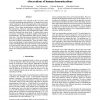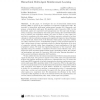688 search results - page 36 / 138 » Using reinforcement learning to adapt an imitation task |
ATAL
2005
Springer
14 years 1 months ago
2005
Springer
Mediation is the process of decomposing a task into subtasks, finding agents suitable for these subtasks and negotiating with agents to obtain commitments to execute these subtas...
ICRA
2002
IEEE
14 years 20 days ago
2002
IEEE
This paper describes a new approach on how to teach a robot everyday manipulation tasks under the “Learning from Observation” framework. Most of the approaches so far assume t...
AGENTS
2001
Springer
14 years 7 days ago
2001
Springer
In this paper, we investigate the use of hierarchical reinforcement learning (HRL) to speed up the acquisition of cooperative multi-agent tasks. We introduce a hierarchical multi-a...
ICANN
2009
Springer
14 years 2 months ago
2009
Springer
Model complexity is key concern to any artificial learning system due its critical impact on generalization. However, EC research has only focused phenotype structural complexity ...
AR
2007
13 years 7 months ago
2007
—Reinforcement learning is the scheme for unsupervised learning in which robots are expected to acquire behavior skills through self-explorations based on reward signals. There a...


